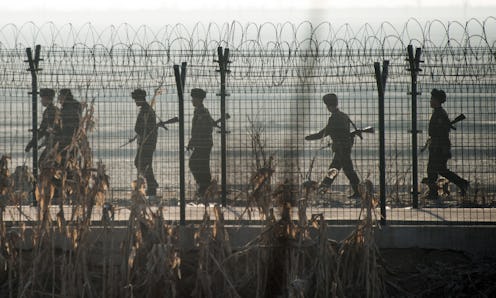News
The Kind Of Work Otto Warmbier Will Have To Do
College student Otto Warmbier has been experiencing the underbelly of the North Korean regime ever since he tried to travel back to the United States and was instead detained at the country's Pyongyang airport. After attempting to commit what many other countries would consider a petty theft, Warmbier has been caught in an international tug of war between the United States and North Korea, one in which the latter has expressed their desire to detain the student and sentence him to 15 years of hard labor. But in a country like North Korea, what kind of labor Warmbier may have to carry out will differ greatly from what he would likely experience in the west.
The student's nightmare originally began in January when he allegedly attempted to steal a North Korean propaganda poster from an employees-only section of a hotel. Warmbier was on a backpacking tour of the country with a travel group of other young Americans at the time. The 21-year-old, who had been studying commerce and economics at the University of Virginia, saw the remainder of his tour group leave the country without incident as he was prevented from boarding his flight.
North Korea is calling his alleged poster-stealing "an act of hostility against the state." In a bizarre trial that included what some international policy experts feel was a coerced confession, the country announced last week that it would sentence Warmbier to 15 years hard labor. But in a strict regime like North Korea's, any action carried out that may be deemed questionable or out of line with the country's message is frequently punished to an extreme.
These types of harsh punishments given out to travelers has been a means North Korea has used to exert power over its adversaries in the past. But BBC reporter Stephen Evans believes that the 15 years hard labor is excessive even by North Korean standards, and "could be due to the particularly high tensions at the moment between North Korea and the U.S."
This hard labor would harken back to the Soviet gulags of the 1940s, off of which the North Korean labor camps were purportedly modeled. Warmbier would face 14- to 16-hour days of extreme work, and would carry on this way likely until death.
Warmbier would be forced to work in unsafe mines, sent to forests to log wood, and toil in factories with no safety precautions. These hazardous working conditions, coupled with poor sanitation and beatings, often break the prisoners. But it's the starvation and malnutrition, with prisoners only fed a handful of corn and soup made from water and salt, that typically ends up claiming the lives of those forced into hard labor.
There is still a silver lining for Warmbier, however. Despite findings from the United Nations that prove otherwise, North Korea denies the existence of these massive political prisoner camps. To send Warmbier to one would be wholeheartedly acknowledging their existence. That's why Suzanne Scholte, chairman of the North Korea freedom coalition, told The Guardian that he will likely receive a much lighter sentence:
This student will not be sent to one of these death camps because they cannot let the world know that they are committing these atrocities. They may put him to work in a labor camp but I would suspect for six months or, I hope, less than a year. They are going to use him and it will depend how much the U.S. pushes the regime to release him.
So there very well may be hope that Warmbier will not have to face the typical, horrific realities of a North Korean labor camp. At the very least, it appears as though he may get out of the excessive 15-year sentence.
